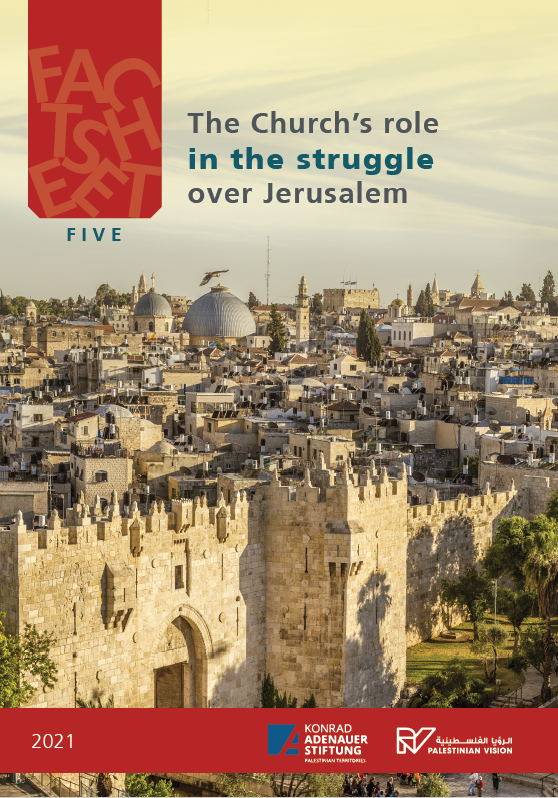Research

Research
December 17, 2022
Research
December 17, 2022Publication Title
INTRODUCTION
The fate of Jerusalem and other holy places in the Holy Land is linked strongly to the legacy and origins of Christianity. This issue has been of particular concern to the heads of different religious denominations. The major churches have led a number of political initiatives designed to guarantee the presence of the Church in the Holy Land, but these initiatives have not been implemented due to extreme political ideologies and the absence of peace in Jerusalem. Factsheet 4 looked at ways that the Church can support the continued existence of Christians in Jerusalem. This factsheet outlines the evolving role of the Church over time, posits what that evolving role means for the future of Jerusalem and examines means by which the Church can help local Christians to overcome problems beyond simply ensuring that the community continues to exist.
Historical involvement of the Church and its community in politics
As a Church: As early as 1922 the Vatican Secretary of State publicly expressed fear that the terms of the British Mandate on Palestine, which at the time was in the process of being approved by the League of Nations, risked affording the Jewish population a privileged position over other religious groups in the Holy Land. Shortly thereafter, the Catholic Church, through the Vatican, led a political initiative among several churches to guarantee the continued presence of the Church in the Holy Land. These fears escalated in subsequent years and led by the Holy See, it was decided that the best solution to protect Church interests and the best solution for everyone concerned at that time, would be the internationalization of Jerusalem, as recommended by the United Nations near the end of the British Mandate in 1947. Church concerns about maintaining Christian and Church presence in the Holy Land continued after the Nakba in 1948. Israeli government leaders created new procedures, regulations, and laws to strengthen their religious and political identity, as well as dominance after taking control of Jerusalem in 1967, within the Old City of Jerusalem in particular. These measures raised concerns among leaders of other religions, including the full spectrum of Christian denominations, both in Jerusalem and abroad. In response, the heads of different churches, represented by local church leaders, issued several statements. Most called for a halt to violence against Palestinians, but particularly against Christian Palestinians attempting to worship, work, study and live in Jerusalem. These public outcries appear to have had little tangible positive impact, however, given that the confiscation of land and buildings in Jerusalem, among other manifestly violent actions, has continued steadily over more than half a century of Israeli occupation and annexation. Church leaders have declared that for Jerusalem to become a city of peace and a place to create harmony among all religions, requires earnest effort because “Jerusalem is a symbol and a promise of the presence of God, of fraternity and peace for humankind, in particular the children of Abraham.” Church leaders always have called upon all parties concerned to comprehend and accept the nature and deep significance of Jerusalem, the City of God. These leaders consistently have maintained that no party should be allowed to appropriate the city for itself and have invited “each party to go beyond all exclusivist visions or actions and, without discrimination, to consider the religious and national aspirations of others, in order to give back to Jerusalem its true universal character and to make of the city a holy place of reconciliation for humankind.” Since 1948, and continuing until the present day, church leaders have issued statements to challenge Israel’s misconduct, but with little tangible success. The Church’s concern increased after Israel’s 1967 Jerusalem occupation and further intensified during the course of two intifadas, both of which enormously impacted the economic, social, and political situation in the city and beyond. read more...

